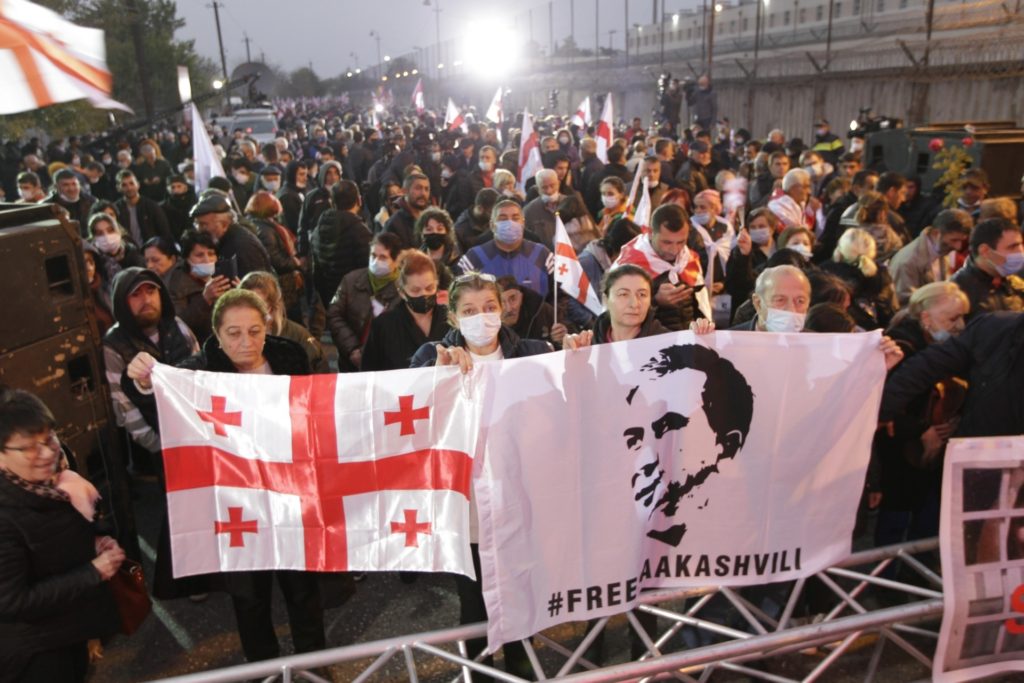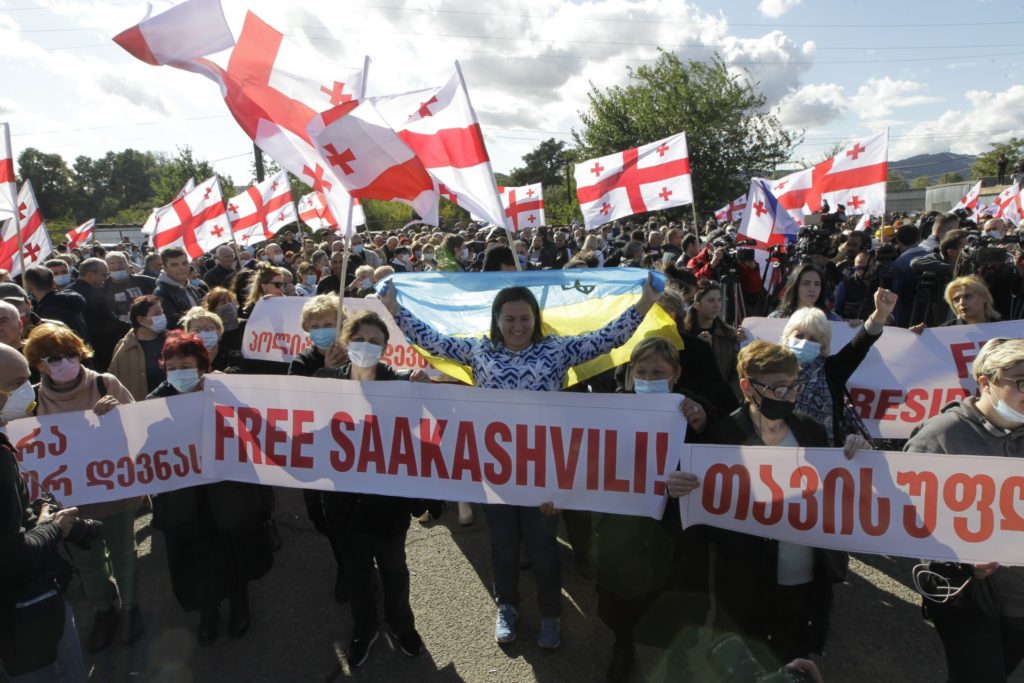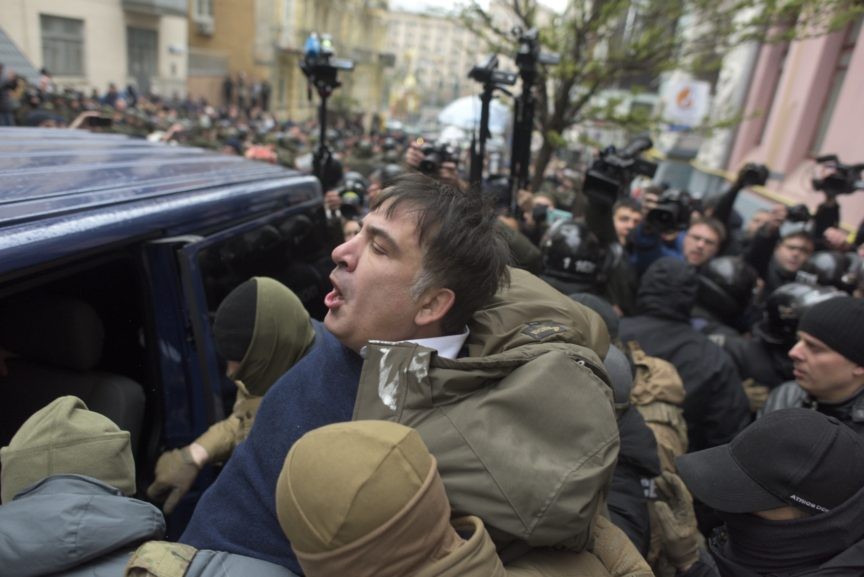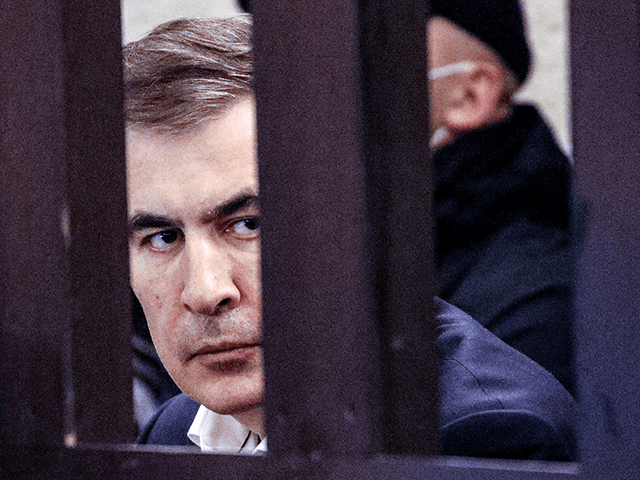Former Georgian President Mikheil Saakashvili — who has been imprisoned in Georgia since October 2021 on corruption charges he denies — launched a hunger strike on Monday to protest the Georgian government’s “treatment of him,” particularly poor medical care, Radio Free Europe/Radio Liberty (RFE/RL) reported.
“I declare an indefinite hunger strike from today,” Saakashvili said in a statement issued to media outlets on February 21.
“The hunger strike is a reaction to how the regime treats me and our people,” Saakashvili said, as quoted by Georgia’s Kutaisi Post.
“I demand proper medical assistance as the Ombudswoman-established Concilium and the [Tbilisi-based nongovernmental] Empathy [Rehabilitation Center for Victims of Torture] have demanded,” Saakashvili said at a trial for his criminal case on February 21, according to RFE/RL.
A court in the Georgian capital, Tbilisi, convicted Saakashvili in absentia on June 28, 2018, of abuse of power by “seeking to cover up evidence about the beating of an opposition member of parliament when he was president,” according to Reuters. Saakashvili received a six-year prison sentence for the abuse of power charges after he was separately sentenced to a three-year prison term in January 2018.

Georgian opposition supporters of former president Mikheil Saakashvili hold national flags and posters with his portraits during a rally in front of the prison where the former president is being held, in Rustavi, about 20 km from the capital Tbilisi, Georgia, Saturday, Nov. 6, 2021. (AP Photo/Shakh Aivazov)
“Saakashvili was sentenced to a separate three years in prison in January after being convicted of seeking to cover up evidence about the murder of a Georgian banker,” Reuters reported in June 2018.

Georgian opposition supporters of former president Mikheil Saakashvili hold Georgian and Ukrainian national flags during a rally in his support in front of the prison where former president is being held, in Rustavi, about 20 km from the capital Tbilisi, Georgia, Monday, Oct. 4, 2021. (AP Photo/Shakh Aivazov)
Saakashvili rose to power in Georgia during the 2003 Rose Revolution, which resulted in the resignation of predecessor Eduard Shevardnadze, only the second person to hold the office. The ouster of Shevardnadze, a former Soviet politician, was largely interpreted as a popular message of rejection of Russian influence in the country, and Saakashvili won the election in large part due to his stance against Russian strongman Vladimir Putin.

Ukrainian Security Service officers detain Mikheil Saakashvili at his house in Kiev, Ukraine, Tuesday, Dec. 5, 2017. (AP Photo/Evgeniy Maloletka)
Putin chose to invade Georgia’s restive South Ossetia and Abkhazia regions during Saakashvili’s tenure in 2008. The ex-leader “won the presidency of Georgia in 2004 on a platform that stressed regaining control of South Ossetia and Abkhazia, two regions that have been under the control of ethnic separatists since the early 1990s,” NPR observed in August 2008. “The separatists had the support of Russia, which has provided them with aid and troops who were part of a peacekeeping mission.”
Saakashvili failed to secure Georgia’s dominance over South Ossetia and Abkhazia, which remain under Russian influence to this day.
“After 2006 we didn’t have the possibility for success by military means … the Russians had repositioned and improved their military infrastructure in the North Caucasus, Abkhazia, and South Ossetia,” Irakli Okruashvil, Georgia’s Defense Minister under Saakashvili, told the news agency at the time.
Following the end of his presidency in 2013, Saakashvili left his country to serve the presidency of Petro Poroshenko in neighboring Ukraine – itself the result of a similar uprising against pro-Russian former President Viktor Yanukovych, and currently subject to a very similar Russian move in its Donetsk and Luhansk regions. Saakashvili received Ukrainian citizenship and the governorship of Odessa with a mandate to eradicate Putin-related corruption. Saakashvili resigned from his position in 2016, accusing Poroshenko himself of corruption. In response, Poroshenko stripped him of Ukrainian citizenship; he had already lost his Georgian citizenship after a pro-Putin government took over there, leaving him stateless.
Saakashvili returned to Georgia on October 1, 2021, following eight years of exile. He attempted to rally opposition forces ahead of Georgia’s nationwide municipal elections at the time before Georgian security forces arrested Saakashvili for “illegal border crossing.”
Saakashvili recently regained Ukrainian citizenship under current President Zelensky – a sitcom comedian who handily beat Poroshenko for the presidency amid widespread discontent with the corruption allegations – who has vowed to work to free Saakashvili from prison.
Saakashvili previously announced a hunger strike in early October 2021 to protest what he described as his “illegal detention” by the Georgian state on October 1, 2021. The politician’s first hunger strike lasted for roughly 50 days before he agreed to end it on November 19, 2021, after his request to be transferred from a prison hospital to a military hospital was met by Georgian government authorities. Georgia’s human rights commissioner said on November 17, 2021, that Saakashvili “needed to be moved to intensive care to avoid the risk of heart failure, internal bleeding and coma after more than a month and a half on hunger strike.”
Moscow on February 21 announced plans to formally recognize the independence of two Russian-backed separatist states in eastern Ukraine’s Donbas region in a move similar to its recognition of South Ossetia and Abkhazia following the 2008 Russo-Georgian War.

COMMENTS
Please let us know if you're having issues with commenting.